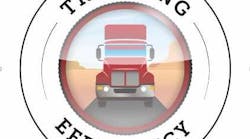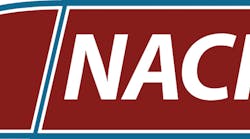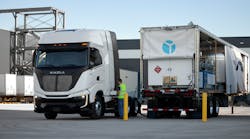According to the just-released latest Annual Fleet Fuel Study by North American Council for Freight Efficiency (NACFE), 19 fleets operating more than 71,000 tractors and 234,000 trailers saw a 1 percent increase in fuel economy in 2016 by adopting a variety of fuel efficiency technologies and products. This, notes Mike Roeth, NACFE’s executive director and operation lead of Trucking Efficiency, is the ninth year in a row trucking fleets have boosted their fuel economy.
“We are thrilled to see that fleets are still seeing fuel economy improvements from their investments,” he says. “While gains are smaller than in the past, any improvement in fuel economy curbs the fleet’s expenses.”
Organizations
NACFE (nacfe.org) is a non-profit organization dedicated to doubling the freight efficiency of North American goods movement by providing an independent, unbiased research organization for the transformation of the transportation industry.
Trucking Efficiency (www.truckingefficiency.org) is a combined effort of NACFE and Carbon War Room (CWR) to double the freight efficiency of North American goods movement through the elimination of market barriers to information demand and supply.
CWR – founded in 2009 as a global nonprofit by Sir Richard Branson and a group of likeminded entrepreneurs – intervenes in markets to accelerate the adoption of business solutions that reduce carbon emissions at gigaton scale and advance the low-carbon economy. In 2014, CWR merged with, and now operates, as part of Rocky Mountain Institute (www.rmi.org), an organizations that engages businesses, communities, institutions and entrepreneurs to transform global energy use to create a clean, prosperous and secure low-carbon future.
MPG
Combined, the fleets that participated in the 2017 Annual Fleet Fuel Study reached an average fuel economy of 7.11 mpg, compared to the U.S. fleet average of 5.89 mpg.
While 7.11 is an average fuel economy number of all trucks owned by the 19 trucking fleets, the 2017 model trucks operated by those fleets achieved 7.8 to 9.2 mpg, with some even approaching 10 mpg, NACFE’s Roeth notes.
Reaching 7.11 mpg resulted in a combined savings of nearly $500 million or $7,020 per year per truck with fuel at $2.34 a gallon.
While fuel economy improved in 2016 over 2015, it did so at a lower percentage increase than the 3 percent increase between 2014 and 2015, the study finds. This is due to a variety of reasons, including fleets eliminating some technologies that improved fuel efficiency, low fuel prices resulting in a reduced focus on fuel efficiency, increased speed, older trucks and hotter weather.
Automated transmissions, tire pressure systems, two-speed fan clutches, low viscosity oil and predictive cruise control all saw increased adoption by fleets. Trailer skirt technology had the quickest ramp up to widespread adoption.
Technology Adoption and Resources
The fleets included in the study achieved the high level of fuel efficiency by adopting a combination of 85 currently available technologies and engaging the resources and guidance of Trucking Efficiency.
The overall adoption rate for the technologies studied has grown from 17 percent in 2003 to 42 percent in 2016.
The fleets provided their purchasing experience for the 85 technologies for tractors and trailers they procured from 2003 to 2016, providing more 21,000 data points to the NACFE team. In the report, those adoption curves are expanded into the future, comparing uptake rates to the ones contributed by the U. S. Environmental Protection Agency’s Regulatory Impact Analysis provided with the final Greenhouse Gas Phase 2 Rule.
“This gives a unique idea of history for these fuel economy technologies and a potential forecast into the future, showing nearly 30 years of data,” Roeth of NACFE says.
The 19 study fleets were: Bison Transport, CR England, Cardinal Logistics, Challenger Motor Freight, Crete Carriers, Frito-Lay, Maverick, Mesilla Valley Transportation, NFI Industries, Nussbaum, Paper Transport, Prime, Ryder, Schneider National, United Parcel Service, Werner, US Express, XPO Logistics and one that was not disclosed.
2012
Since 2012, NACFE has conducted its Annual Fleet Fuel Study to report on innovative fleets that have committed to improving fuel efficiency. Fleets that participate in the study share their implementation experiences, as well as best practices for using these technologies.
The study, explains Roeth, provides insights to help other fleets make more informed decisions about adding these fuel efficiency technologies and practices in the future. It also provides feedback for manufacturers to improve their product’s total cost of ownership.
The full 2017 Annual Fleet Fuel Study can be downloaded at http://www.truckingefficiency.org/annual-fleet-fuel-studies.
Run on Less
Trucking Efficiency will continue to promote fuel savings opportunities in the trucking industry through Run on Less (www.runonless.com), a first-of-its kind, cross-country trucking efficiency roadshow and through Confidence Reports and workshops.
Run on Less will demonstrate how Class 8 trucks can use different technologies to achieve the best fuel economy possible. The three-week experience will kick off from multiple locations across the U.S. on September 6 and culminate at the inaugural North American Commercial Vehicle (NACV) show in Atlanta, taking place this September 24 to 28.
Updates on Run for Less will be posted daily on its website.
Run on Less is led by NACFE and CWR’s Trucking Efficiency, with Shell and PepsiCo as the title sponsors.
Confidence Reports
Trucking Efficiency’s Confidence Reports are intended to help end users and manufacturers determine whether to adopt a specific technology or set of solutions.
Confidence Reports have been done on tire pressure systems, 6x2 axle configurations, idle reduction technology, electronically controlled transmissions, programmable engine parameters, low rolling resistance tires, lightweighting and downspeeding.
Confidence Reports can be found online at www.nacfe.org/projects/.




